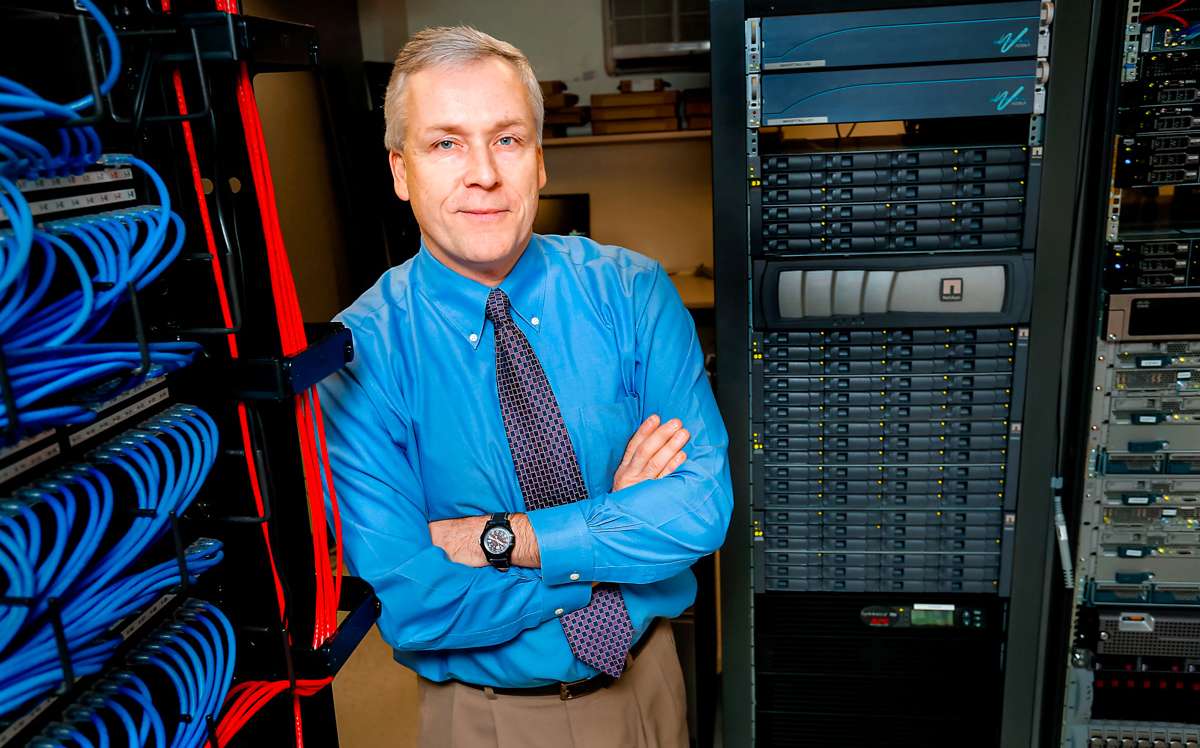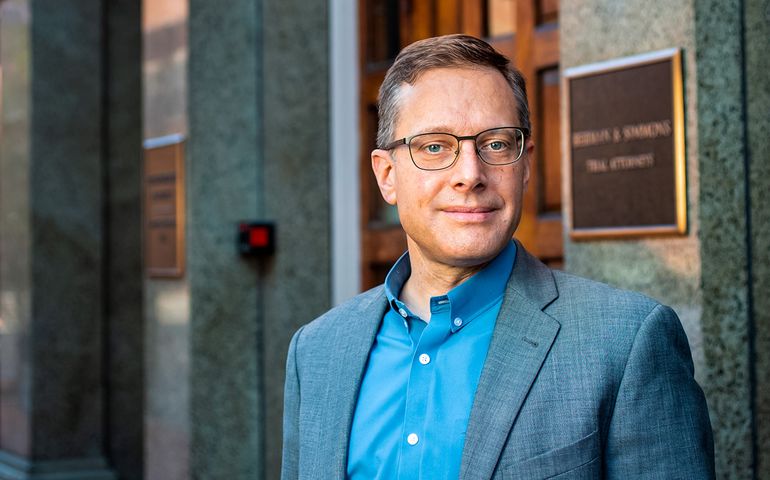
The jury is out: With civil trials at a standstill, attorneys look to ease the backlog
 Photo / Tim Greenway
Craig Bramley, managing director at Berman & Simmons, outside the firm's office in Portland.
Photo / Tim Greenway
Craig Bramley, managing director at Berman & Simmons, outside the firm's office in Portland.
As the COVID-19 pandemic arrived then began altering virtually every corner of work and home life, Maine’s civil litigation system adjusted, doing much of the initial work, like depositions, by video conference.
But jury trials were shut down in March, and it’s there that cases are hitting a wall. There’s a backlog of more than 6,000 criminal cases on the state’s dockets, which means lower-priority civil trials won’t get their day in court any time soon.
“That’s a huge deal for our clients,” says Craig Bramley, managing director of Berman & Simmons. “I know of multiple cases that are just sitting there.”
No number is available for the amount of civil trials waiting for a court date — cases move through the system differently than criminal ones — but people haven’t stopped filing lawsuits, and the number is growing.
The inability to resolve cases is felt keenly, Bramley says.
“Every time we take on a case, we’re taking responsibility to work on behalf of that client. What we’re representing them on is often the worst thing that’s happened in their life. We recognize that the case is incredibly important to our client, and we take that obligation seriously.”
Christian Lewis, an attorney at Hardy, Wolfe & Downing and president of the Maine Trial Lawyers Association, says the backlog has ripple effects on the economy, as business, probate, real estate and other disputes stall.
Those involved understand that the bottleneck isn’t anyone’s fault. “But they want their day in court, and they have the right to that,” Lewis says.
Creative solutions sought
Normal liability cases go through months of discovery, including depositions, and then are scheduled in Superior Court. The case eventually lands on a jury trial list that goes back about nine months.
“That’s a long timeline, and the last thing that someone involved in one of these cases wants is to make it even longer,” Bramley says.
Civil cases were originally due to resume Nov. 9, but that’s been put off. Criminal jury trials are slowly starting up first, a higher priority because of the constitutional right to a speedy trial.
Depending on the pandemic and how quickly the criminal backlog is resolved, it could be well into next year, or longer, before civil jury trials are convened, those in the system say.
Berman & Simmons, along with the Maine Trial Lawyers Association and Maine Bar Association, as well as individual lawyers and law firms, is exploring ways to take care of some of the issues.
“How can we look for new ideas and help the court envision different ways of doing it?” Bramley says.
Small rooms, lots of people
So far, the answer seems to be there’s no good answer.
For instance, video trials have been discussed, but a key aspect of a trial is that the jury gets a good look at who’s testifying and weighs their credibility. That’s harder to do on Zoom. In person won’t necessarily solve that — it’s also hard to do when everyone’s wearing a mask, attorneys say.
Most of the state’s courtrooms are small, says Dan Mitchell, co-chair of Bernstein Shur’s litigation and dispute resolution group. “Fine if you want to move a lot of cases through the system. Not fine if you want to space people out.”
There’s talk about finding venues outside the court — auditoriums, for instance.
“Our justice system is fantastic, but it hasn’t really changed in terms of the fundamentals in a very long time,” he says. “And it requires getting people in these rooms, and a lot of social interaction, and it just doesn’t lend itself well to when you have a pandemic.
“Larger space would help, but I don’t think that’s the only solution,” he adds. “It’s a resource problem.”

The state judicial system has a personnel shortage, including judges, who must be appointed by the governor and approved by the Legislature, which hasn’t met in full since March. There’s also a shortage of judicial marshals, necessary for court security.
On top of that are the logistical issues. For instance, there are separate bathrooms for attorneys, so they don’t have awkward meetings with jurors, witnesses and others. And juries must be separated from everyone else, ushered around by bailiffs.
“Just getting people in and out of the building in the morning is harder,” says Mitchell. “it’s taking more time, the screening process is taking more time.”
Big hurdles
Lewis, of the MTLA, says there’s no magic solution. “There are some big hurdles.”
The association plans to ask the Legislature to budget for more judicial marshals when it reconvenes in January, but that won’t help short-term.
That’s assuming the request even makes the cut. “Our state budget problems are huge,” Bramley says. “There’s not going to be a pot of money.”
In some cases, both sides opt for mediation when they normally wouldn’t have. Otherwise, currently, the options are few.
“To credit everyone involved, cases do continue to resolve,” says Bramley. “I wouldn’t say necessarily with the same payment as in the past. But there are more and more cases where the parties simply can’t agree. In the past those would fall into the normal trial calendar, and those cases are just sitting there and waiting.”
It’s the looming trial that often spurs a settlement, so lack of settlements are a ripple effect of the trial backlog.
“The value of the case often depends on a jury trial, or what might happen at a jury trial,” says Bramley. If an insurance company thinks a jury might give $10,000 on a case, the company isn’t going to settle for $100,000.
Clients, too, often don’t want to settle. In many cases the settlement is needed to cover wage loss, medical bills and more. “They can’t accept a lesser settlement,” Bramley says.
One positive resolution
Medical malpractice cases are on a different track than normal litigation. They go to a panel to determine their merit before going to trial. It’s up to the plaintiff whether to go to court, no matter the result, but the system was designed to resolve more cases before they got there.
Bramley, who handled mostly medical malpractice cases before becoming managing director six years ago, says the panel system is operating efficiently, despite the pandemic.
Like many businesses, early on some involved were saying “It has to happen in person, so therefore we have to stop everything,” he says.
“We represent people who’ve had a terrible thing happen in their life and they’re seeking justice for it, they’re seeking compensation, maybe they need that to live or get the care they need,” he says. “So we very much wanted these to keep moving.”
Attorneys at Berman & Simmons were among those who pushed the court system to adopt video conferencing. Lawyers in his office have done panel hearings, via Zoom, where evidence is presented, and all the parties participate remotely. Witnesses are still sworn in and the court reporter organizes the conference.
Something that seemed scarily out of the box in March is now standard operating procedure.
Bramley says that heartens him that solutions to the trial backlog can be found.
Meanwhile, “We continue to file cases, we continue to move these cases forward.”














0 Comments